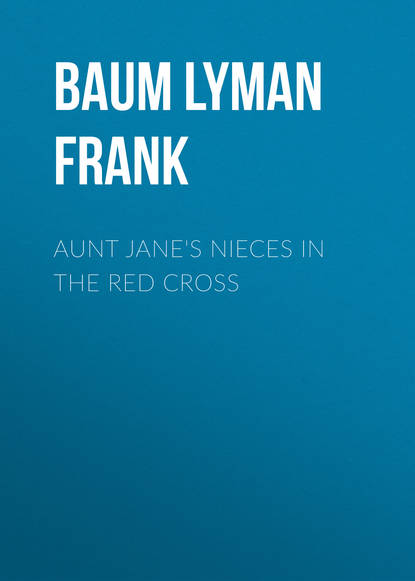По всем вопросам обращайтесь на: info@litportal.ru
(©) 2003-2024.
✖
Aunt Jane's Nieces in the Red Cross
Настройки чтения
Размер шрифта
Высота строк
Поля
The girl-wife studied her face a moment and then dropped her hand and hurried after her mother.
"I fibbed, Uncle," said Patsy despondently. "I fibbed willfully. But – how could I help it when she looked at me that way?"
CHAPTER XV
DR. GYS SURPRISES HIMSELF
Henderson was waiting with the launch at the Ostend docks. Lieutenant von Holtz was earnestly thanked by Patsy and Uncle John for his kindness and in return he exacted a promise from them to hunt him up in Germany some day, when the war was ended. The countess and Mrs. Denton, sad and black-robed, had been made comfortable in the stern seats of the boat and the captain was just about to order Henderson to start the engine when up to them rushed the fat Belgian woman and her two children.
Without an instant's hesitation the two youngsters leaped aboard like cats and their mother would have followed but for the restraining hand of Captain Carg.
"What does this mean?" cried Mr. Merrick angrily.
The woman jabbered volubly in French.
"She says," interpreted Patsy, "that we promised to take her to Dunkirk, so she may find her husband."
"Let her walk!" said Uncle John.
"The Germans won't allow her to cross the lines. What does it matter, Uncle? We have plenty of room. In three hours we can be rid of them, and doubtless the poor thing is really anxious to find her lost husband, who was last seen in Dunkirk."
"He is a spy, and a traitor to both sides, according to report."
"That isn't our affair, is it? And I suppose even people of that class have hearts and affections."
"Well, let her come aboard, Captain," decided Uncle John. "We can't waste time in arguing."
They stowed her away in the bow, under Henderson's care, and threatened the children with dire punishment if they moved from under her shadow. Then the launch sped out into the bay and away toward Dunkirk.
Three days had brought many changes to the hospital ship Arabella. Of the original batch of patients only Lieutenant Elbl, the German, and Andrew Denton now remained. All the others had been sent home, transferred to the government hospitals or gone back to the front, according to the character of their injuries. This was necessary because their places were needed by the newly wounded who were brought each day from the front. Little Maurie was driving the ambulance again and, with Ajo beside him and Dr. Kelsey and a sailor for assistants, the Belgian would make a dash to Ypres or Dixmude or Furnes and return with a full load of wounded soldiers.
These were the days of the severest fighting in Flanders, fighting so severe that it could not keep up for long. There would come a lull presently, when the overworked nurses and surgeons could get a bit of sleep and draw a long breath again.
Gys had elected to remain aboard the ship, where with Maud and Beth he was kept busy night and day. Two French girls – young women of good birth and intelligence – had been selected by Dr. Gys from a number of applicants as assistant nurses, and although they were inexperienced, their patriotic zeal rendered them valuable. They now wore the Red Cross uniforms and it was decided to retain them as long as the ship's hospital remained crowded.
There was plenty of work for all and the worry and long hours might have broken down the health and strength of Beth and Maud had not the doctor instituted regular periods of duty for each member of the force and insisted on the schedule being carried out.
This hospital ship was by no means so gloomy a place as the reader may imagine. The soldiers were prone to regard their hurts lightly, as "a bit of hard luck," and since many had slight injuries it was customary for them to gather in groups upon the deck, where they would laugh and chat together, play cards for amusement or smoke quantities of cigarettes. They were mainly kind-hearted and grateful fellows and openly rejoiced that the misfortunes of war had cast their lot on this floating hospital.
Under the probe of the surgeon to-day, a fortnight hence back on the firing line, was not very unusual with these brave men. The ambulances had gathered in a few German soldiers, who would become prisoners of war on their recovery, and while these were inclined to be despondent and unsociable they were treated courteously by all, the Americans showing no preference for any nation. The large majority of the patients, however, came from the ranks of the Allies – French, English and Belgian – and these were men who could smile and be merry with bandaged heads, arms a-sling, legs in splints, bullet holes here and there, such afflictions being regarded by their victims with a certain degree of pride.
Dr. Gys was in his element, for now he had ample opportunity to display his skill and his patients were unable to "jump to another doctor" in case his ugly features revolted them. His main interest, however, lay in the desperately wounded Belgian private, Andrew Denton, whom he had agreed to keep alive until the return of Miss Doyle and her uncle.
In making this promise Gys had figured on a possible delay of several days, but on the second day following Patsy's departure the sudden sinking of his patient aroused a defiant streak in the surgeon and he decided to adopt drastic measures in order to prevent Denton from passing away before his wife's arrival.
"I want you to assist me in a serious operation," he said to Maud Stanton. "By all the rules and precedents of human flesh, that fellow Denton ought to succumb to his wound within the next three hours. The shell played havoc with his interior and I have never dared, until now, to attempt to patch things up; but if we're going to keep him alive until morning, or until your cousin's return, we must accomplish the impossible."
"What is that?" she inquired.
"Remove his vital organs, tinker them up and put them back so they will work properly."
"Can that be done, doctor?"
"I think not. But I'm going to try it. I am positive that if we leave him alone he has less than three hours of life remaining; so, if we fail, Miss Stanton, as it is reasonable to expect, poor Denton will merely be spared a couple of hours of pain. Get the anaesthetics, please."
With all her training and experience as a nurse, Maud was half terrified at the ordeal before her. But she realized the logic of the doctor's conclusion and steeled her nerves to do her part.
An hour later she stood looking down upon the patient. He was still upon the operating table but breathing quietly and as strongly as at any time since he had received his wound.
"This shows," Dr. Gys said to her, his voice keen with elation, "what fools we are to take any human condition for granted. Man is a machine. Smash his mechanism and it cannot work; make the proper repairs before it is too late and – there he goes, ticking away as before. Not as good a machine as it was prior to the break, but with care and caution it will run a long time."
"He will live, then, you think?" she asked softly, marveling that after what she had witnessed the man was still able to breathe.
Gys leaned down and put his ear to the heart of the patient. For two minutes he remained motionless. Then he straightened up and a smile spread over his disfigured features.
"I confidently believe, Miss Stanton, we have turned the trick! Luck, let us call it, for no sensible surgeon would have attempted the thing. Rest assured that Andrew Denton will live for the next ten days. More than that, with no serious set-back he may fully recover and live for many years to come."
He was so pleased that tears stood in his one good eye and he wiped them away sheepishly. The girl took his hand and pressed it in both her own.
"You are wonderful – wonderful!" she said.
"Don't, please – don't look in my face," he pleaded.
"I won't," she returned, dropping her eyes; "I will think only of the clever brain, the skillful hand and the stout heart."
"Not even that," he said. "Think of the girl wife – of Elizabeth. It was she who steadied my hand to-day. Indeed, Miss Stanton, it was Elizabeth's influence that saved him. But for her we would have let him die."
CHAPTER XVI
CLARETTE
So it was toward evening of the fourth day that the launch finally sighted the ship Arabella. Delays and difficulties had been encountered in spite of government credentials and laissez-passer and Patsy had begun to fear they would not reach the harbor of Dunkirk before dark.
All through the journey the Belgian woman and her children had sat sullenly in the bow, the youngsters kept from mischief by the stern eye of Henderson. In the stern seats, however, the original frigid silence had been thawed by Patsy Doyle's bright chatter. She began by telling the countess and Elizabeth all about herself and Beth and Maud and Uncle John, relating how they had come to embark upon this unusual mission of nursing the wounded of a foreign war, and how they had secured the services of the clever but disfigured surgeon, Dr. Gys. She gave the ladies a clear picture of the hospital ship and told how the girls had made their dash to the firing line during the battle of Nieuport and brought back an ambulance full of wounded – including Andrew Denton.
Patsy did not answer very fully Elizabeth Denton's eager questions concerning the nature of her husband's injuries, but she tried to prepare the poor young wife for the knowledge that the wound would prove fatal. This was a most delicate and difficult thing to do and Patsy blundered and floundered until her very ambiguity aroused alarm.
"Tell me the worst!" begged Elizabeth Denton, her face pale and tensely drawn.
"Why, I cannot do that, you see," replied Patsy, "because the worst hasn't happened yet; nor can I tell you the best, because a wound is such an uncertain thing. It was a shell, you know, that exploded behind him, and Dr. Gys thought it made a rather serious wound. Mr. Denton was unconscious a long time, and when he came to himself we eased his pain, so he would not suffer."
"You came to get me because you thought he would die?"
"I came because he asked me to read to him your letters, and I found they comforted him so much that your presence would, I knew, comfort him more."
There was a long silence. Presently the countess asked in her soft, even voice:
"Will he be alive when we get there?"

















